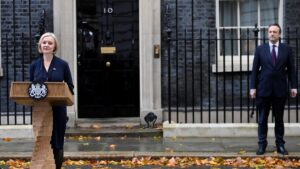
Liz Truss has announced she is resigning after 44 days in office, becoming the shortest-serving prime minister in British history.
She announced that she would stand down after losing the confidence of Tory MPs and cabinet ministers.
She said a successor would be chosen within a week “to deliver our fiscal plans and maintain our country’s economic stability”. It is not clear whether the contest will go to the Conservative membership or if Tory MPs will be asked to crown her successor.
In a statement outside Truss said she could not deliver on “the mandate on which I was elected by the Conservative Party”.
She said: “This morning I met the chairman of the 1922 committee. Sir Graham Brady, We’ve agreed that there will be a leadership election to be completed within the next week. This will ensure that we remain on a path to deliver our fiscal plans and maintain our country’s economic stability and national security.”
Her resignation will trigger frenetic moves by Tory MPs to find a successor to unite behind without the need for another damaging leadership contest. Her decision to quit means she beats the record of George Canning, who died in 1827 after 119 days as prime minister.
It follows the departure yesterday of Suella Braverman, the home secretary, after a row with Truss on immigraiton policy. She was also blamed for chaotic scenes in the House of Commons after attempting to force a vote on fracking.
Truss’s decision came after she spent more than an hour with Sir Graham Brady, chairman of the 1922 committee. Downing Street said Truss had asked to see Brady to help take the temperature among Tory MPs, rather than because he was telling her to resign. But with backbenchers furious at government chaos it became apparent that Truss could not continue indefinitely in Downing Street.
Thérèse Coffey, the deputy prime minister, and Jake Berry, the party chairman, were seen entering No 10 to join the meeting. Coffey, one of Truss’s closest allies, is likely to have been crucial in helping Truss decide to quit.
Brady has long been seen as the figure who will decide when Truss goes by conveying to her that enough MPs want her to go. Berry will also help decide whether any successor can be chosen purely among MPs or If Tory members must have a say.
Backbenchers believe that a quick MP-only contest is feasible as they struggle to find a unity candidate. The 1922 committee can set the rules for the first stage of the contest in such a way that only one candidate is able to make it through, although this could in theory be challenged by the Conservative party board, chaired by Berry.
Read more:
Liz Truss resigns as prime minister





